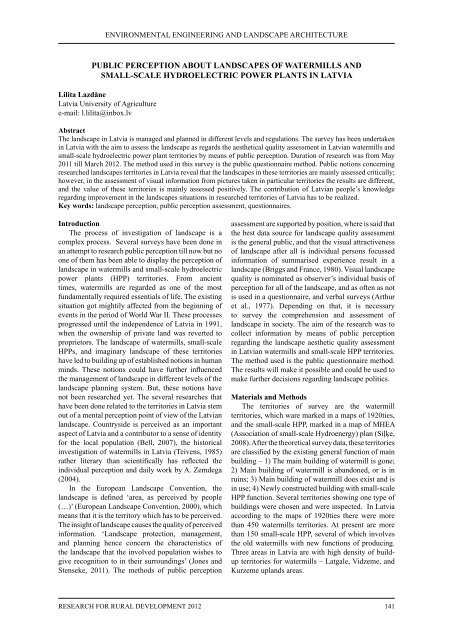RESEARCH FOR
RESEARCH FOR
RESEARCH FOR
You also want an ePaper? Increase the reach of your titles
YUMPU automatically turns print PDFs into web optimized ePapers that Google loves.
ENVIRONMENTAL ENGINEERING AND LANDSCAPE ARCHITECTURE<br />
publIc perceptIon about landscapes of WatermIlls and<br />
small-scale HydroelectrIc poWer plants In latvIa<br />
Lilita Lazdāne<br />
Latvia University of Agriculture<br />
e-mail: l.lilita@inbox.lv<br />
abstract<br />
The landscape in Latvia is managed and planned in different levels and regulations. The survey has been undertaken<br />
in Latvia with the aim to assess the landscape as regards the aesthetical quality assessment in Latvian watermills and<br />
small-scale hydroelectric power plant territories by means of public perception. Duration of research was from May<br />
2011 till March 2012. The method used in this survey is the public questionnaire method. Public notions concerning<br />
researched landscapes territories in Latvia reveal that the landscapes in these territories are mainly assessed critically;<br />
however, in the assessment of visual information from pictures taken in particular territories the results are different,<br />
and the value of these territories is mainly assessed positively. The contribution of Latvian people’s knowledge<br />
regarding improvement in the landscapes situations in researched territories of Latvia has to be realized.<br />
Key words: landscape perception, public perception assessment, questionnaires.<br />
Introduction<br />
The process of investigation of landscape is a<br />
complex process. Several surveys have been done in<br />
an attempt to research public perception till now but no<br />
one of them has been able to display the perception of<br />
landscape in watermills and small-scale hydroelectric<br />
power plants (HPP) territories. From ancient<br />
times, watermills are regarded as one of the most<br />
fundamentally required essentials of life. The existing<br />
situation got mightily affected from the beginning of<br />
events in the period of World War II. These processes<br />
progressed until the independence of Latvia in 1991,<br />
when the ownership of private land was reverted to<br />
proprietors. The landscape of watermills, small-scale<br />
HPPs, and imaginary landscape of these territories<br />
have led to building up of established notions in human<br />
minds. These notions could have further influenced<br />
the management of landscape in different levels of the<br />
landscape planning system. But, these notions have<br />
not been researched yet. The several researches that<br />
have been done related to the territories in Latvia stem<br />
out of a mental perception point of view of the Latvian<br />
landscape. Countryside is perceived as an important<br />
aspect of Latvia and a contributor to a sense of identity<br />
for the local population (Bell, 2007), the historical<br />
investigation of watermills in Latvia (Teivens, 1985)<br />
rather literary than scientifically has reflected the<br />
individual perception and daily work by A. Zemdega<br />
(2004).<br />
In the European Landscape Convention, the<br />
landscape is defined ‘area, as perceived by people<br />
(…)’ (European Landscape Convention, 2000), which<br />
means that it is the territory which has to be perceived.<br />
The insight of landscape causes the quality of perceived<br />
information. ‘Landscape protection, management,<br />
and planning hence concern the characteristics of<br />
the landscape that the involved population wishes to<br />
give recognition to in their surroundings’ (Jones and<br />
Stenseke, 2011). The methods of public perception<br />
ReseaRch foR RuRal Development 2012<br />
assessment are supported by position, where is said that<br />
the best data source for landscape quality assessment<br />
is the general public, and that the visual attractiveness<br />
of landscape after all is individual persons focussed<br />
information of summarised experience result in a<br />
landscape (Briggs and France, 1980). Visual landscape<br />
quality is nominated as observer’s individual basis of<br />
perception for all of the landscape, and as often as not<br />
is used in a questionnaire, and verbal surveys (Arthur<br />
et al., 1977). Depending on that, it is necessary<br />
to survey the comprehension and assessment of<br />
landscape in society. The aim of the research was to<br />
collect information by means of public perception<br />
regarding the landscape aesthetic quality assessment<br />
in Latvian watermills and small-scale HPP territories.<br />
The method used is the public questionnaire method.<br />
The results will make it possible and could be used to<br />
make further decisions regarding landscape politics.<br />
materials and methods<br />
The territories of survey are the watermill<br />
territories, which ware marked in a maps of 1920ties,<br />
and the small-scale HPP, marked in a map of MHEA<br />
(Association of small-scale Hydroenergy) plan (Siļķe,<br />
2008). After the theoretical survey data, these territories<br />
are classified by the existing general function of main<br />
building – 1) The main building of watermill is gone;<br />
2) Main building of watermill is abandoned, or is in<br />
ruins; 3) Main building of watermill does exist and is<br />
in use; 4) Newly constructed building with small-scale<br />
HPP function. Several territories showing one type of<br />
buildings were chosen and were inspected. In Latvia<br />
according to the maps of 1920ties there were more<br />
than 450 watermills territories. At present are more<br />
than 150 small-scale HPP, several of which involves<br />
the old watermills with new functions of producing.<br />
Three areas in Latvia are with high density of buildup<br />
territories for watermills – Latgale, Vidzeme, and<br />
Kurzeme uplands areas.<br />
141


